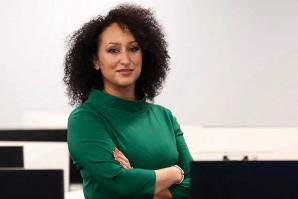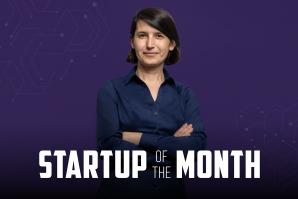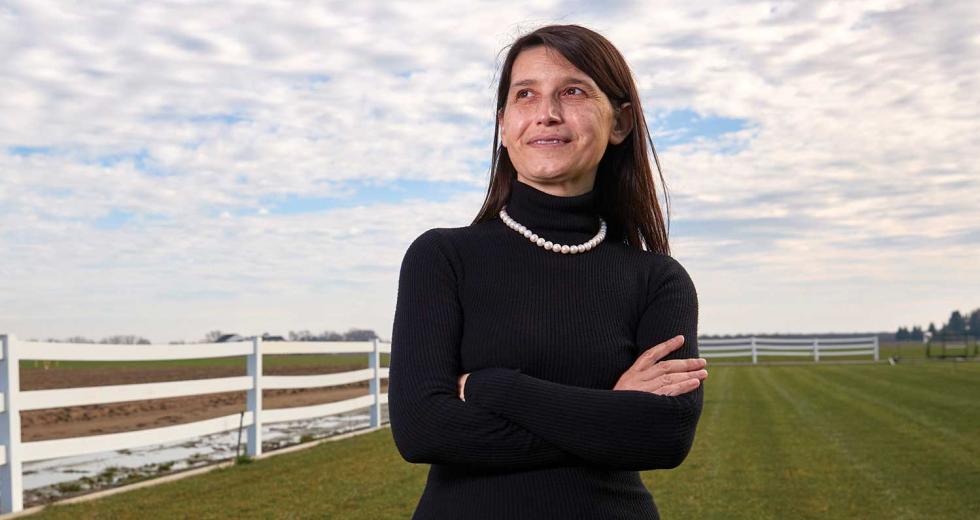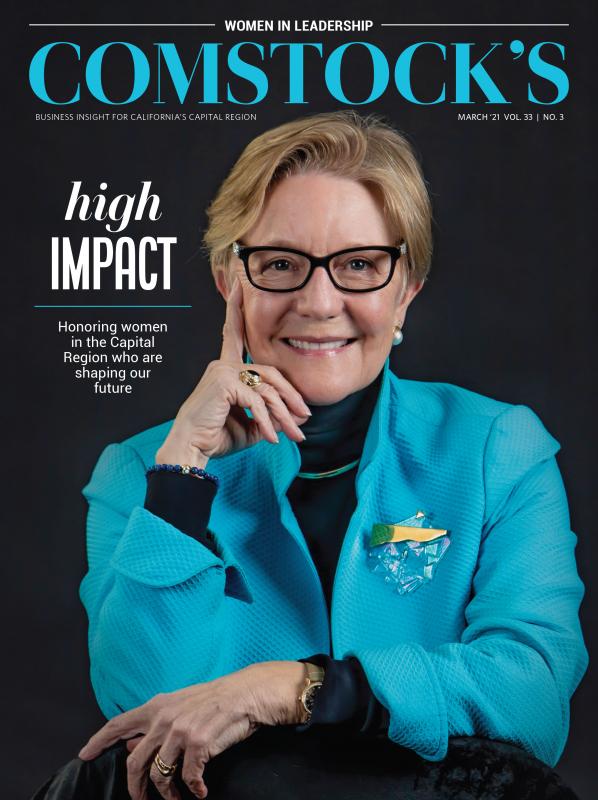When Fatma Kaplan discovered a particular species of microscopic roundworms had a mating pheromone, chemical signals that trigger mating behaviors, she knew it could have significant applications to control agricultural pests. It meant nematodes’ pheromones could be used to manipulate their behavior. Microscopic roundworms, called nematodes, live in the soil and are the most abundant animals on Earth. Some are beneficial and kill agricultural pests, while others are harmful and feed on the roots of crops.
In 2008, Kaplan published her research in the journal Nature, and the U.S. Department of Agriculture hired her to apply the discovery to control the root-knot nematode, a pest responsible for $90 billion in global crop loss annually, according to research in The Journal of Nematology. But her temporary position ended in 2012, as government funds began to shrink.
Then, in 2017, Kaplan cofounded Pheronym and is CEO of the Davis-based company, the first in the world to use nematode pheromones to control agricultural pests. She focuses on dispersal pheromones, which trigger nematodes to search for food, enabling her to capitalize on the commercial market for beneficial nematodes already in place. Farmers purchase and spray beneficial nematodes over agricultural fields to boost the soil’s health and ecosystem.
Activating the nematodes with pheromones using Pheronym’s first product, Nemastim, which is expected to hit the market in 2022, boosts their ability to disperse into the soil deeper and farther and makes them more effective at infecting pests in the soil with a bacteria that kills them.The technology addresses major agricultural challenges. It provides a replacement for chemical pesticides, which pollute the planet and kill the organisms responsible for soil health, as efforts to ban toxic pesticides sweep the globe. In 2015, methyl bromide was phased out globally among United Nations countries, and while some neonicotinoids are still used in the U.S., the last of five formerly approved for use in 2013 were banned in the European Union in 2020. Pheronym’s technology gives beneficial nematodes more ammunition to naturally control agricultural pests, which continue to spread as the climate warms.
Pheronym has raised more than $1 million in funding, with the majority coming from grants, including the National Science Foundation Small Business Innovation Research program, and signed a five-year cooperative research and business development agreement with the USDA in November 2020. Despite proof of concept and innovative technology that aligns with a growing awareness and adoption of eco-friendly agricultural practices, Kaplan has yet to secure traditional venture capital.
It’s a common thread for women in an industry in which most of the wealth and power has been controlled by white men. According to Pitchbook, a financial data and software company based in Seattle, women founders received 2.7 percent of venture capital invested in 2019. Despite the gap in gender (and racial) equity, women founders in the Capital Region are developing groundbreaking technology in biotech and ag-tech, emerging industries where territory is still uncharted and that may provide the opportunity for women to secure equity in these markets.
“If you’re a biotech company … the scientist has the vision how to make it, at least in the early stages. I cannot think of anyone (else) who would be able to have the passion and the vision to lead the company and express that vision.”
FATMA KAPLAN Cofounder and CEO, Pheronym
Kaplan, who was born and raised in Turkey and has a Ph.D. in plant molecular and cellular biology from the University of Florida, says she always has to convince people she’s the right person to be CEO of her company. As a woman, she says, people perceive her in a supportive role rather than the lead, and when they see she is CEO, they expect her to have a business degree. “But if you’re a biotech company … the scientist has the vision how to make it, at least in the early stages,” she says. “I cannot think of anyone (else) who would be able to have the passion and the vision to lead the company and express that vision.”
Landing Seed Funds
Kaplan’s philosophy resonates with San Francisco-based science accelerator IndieBio, which invested $250,000 in Pheronym, the initial seed funds it provides to each company it invests in. IndieBio invests in biology-based innovative technology tackling global issues.
“It’s a founder-first, a scientist-first model,” Po Bronson, IndieBio’s managing director and partner, says of the accelerator’s business methodology, which rejects conventional thinking that scientists can’t become great business executives and founders need extensive business experience. Additionally, the company has invested in 136 startups with 44 percent of those companies with at least one women cofounder, says Bronson.
“It’s flatly and plainly obvious there’s prejudice and bias in the system against women. … Let’s call it what it is,” says Bronson. “In the world of venture capital, this is improving, but I think everybody would say it’s not improving fast enough, and it’s not improving fast enough for founders of color either.”
While Bronson doesn’t discount the value of business experience, especially down the road, he says a lot of it can be learned on the fly, and those with business experience can be hired for other positions or as consultants.
That’s what Kaplan did. She hired Pam Marrone, a pioneer in biological and nonchemical products for agriculture, to advise Pheronym as it seeks another $2 million to $2.5 million for manufacturing and scaling production. Efforts to raise additional funds will follow for research and development of its second product, Pheracoat, a pheromone-based seed treatment that tricks the root-knot nematode by making them unable to detect the roots on which they feed.
Marrone founded Davis-based bio-ag companies AgraQuest and Marrone Bio Innovations, raising more than $200 million in venture capital. She took MBI public in 2013, making her one of 22 women in the U.S. to lead their companies to an initial public offering, 17 of which did so in the last seven years, according to Business Insider.
“It’s flatly and plainly obvious there’s prejudice and bias in the system against women. … Let’s call it what it is. In the world of venture capital, this is improving, but I think everybody would say it’s not improving fast enough, and it’s not improving fast enough for founders of color either.”
PO BRONSON Managing director and partner, IndieBio
Marrone, who recently retired as CEO of Marrone Bio Innovations, advises entrepreneurs and startups through her privately held company, Marrone Bio Advisors, and places an emphasis on women-led startups to shrink the gender gap. “Women do not have the kind of networks and support to raise funds,” says Marrone. “For example, I am advising a young male entrepreneur, and compared to the women I am advising, he has a swarm of established men jumping in to create a cocoon of influence around him, opening their networks to find him investors.”
But that is changing, says Marrone, with incubators and accelerators (such as IndieBio) providing more formal networks for female entrepreneurs to fill the void.
Helping Those in Need
Le Thuy Vuong, founder and chief technology officer of Davis-based The Redmelon Company, founded in 2012, also hired Marrone as interim CEO. Vuong, a Ph.D. scientist, launched her company to use the nutrient-dense gac fruit, which originates from Southeast Asia, to address vitamin A deficiency in children and young mothers in Vietnam, where she was born and raised, as well as in India, Laos, Cambodia and other rural communities. The deficiency causes a host of medical conditions, including delayed growth in children and night blindness in adults.
She invented the oil extract process of the gac fruit — a bright-orange, oval fruit covered with short spikes — and patented her technique, SafeStraction, which doesn’t use toxic solvents, to create products that can be added to foods, beverages, cosmetics and nutritional supplements and has applications for the alternative-protein and CBD oil markets.
Marrone is leading efforts to raise $2 million to $4 million to scale production and build the company’s own manufacturing facility, as well as facilitate potential partnerships to incorporate the oil into foods such as rice. The company is in talks with Mars and Nestle, which sell products in countries with vitamin A deficiencies, to add the gac oil into popular candy products. Marrone is also helping to develop the company’s e-commerce platform expected to launch this year.
Vuong says there is a sharp contrast in how she’s perceived as she works with potential partners compared to the 1990s, when she was the founder and CEO of her former company, Fishrock Laboratories, and attributes that to the success of talented women executives such as Marrone who have shown women can also run a successful business.
“To me, there’s no distinction between the need for women or for men. … If we keep thinking that there are differences between men and women, we continue on with that thread,” says Vuong. She acknowledges women typically are raised to be more facilitating, accommodating and empathetic. “But it should not make it that we are always the facilitator, the accommodator, but also a good leader because of that too.”
Vuong is one of several women of color in ag-tech featured in the 27-minute documentary “From Farms to Incubators,” produced by Amy Wu and Chris Schodt in 2017. When Wu began reporting on agriculture and ag-tech for The Salinas Californian in 2016, she noticed there was a lack of women (and even fewer women of color) in CEO or decision-making positions in either industry. That piqued her curiosity. When she discovered a few, it felt like an untold story, says Wu. She wanted to give them voices, and as she reported, she became captivated by the challenges farmers are facing as well as by the women’s personal stories and drive to develop innovative technology to solve those challenges.
That propelled Wu to found From Farms to Incubators, a multimedia storytelling platform. “I think there’s a real need for a community for women in this space and women who are interested in this space as a place to network and connect with each other but also a place where everybody from policymakers to growers to investors, those who want to seek out women founders, have a place to go,” says Wu.
Creating an Impact
Shely Aronov, cofounder and CEO of Davis-based biotech startup InnerPlant, earned her degree in industrial engineering at Tel Aviv University in Israel, where she was born and raised, graduated from Stanford University with an MBA, and launched the food brand, Yamba Hummus. Then in 2016, when she had her first child, she had an epiphany: She wanted to create a positive impact on the world.
Aronov was passionate about food, so when her father-in-law, a nanoelectronics professor at Tel Aviv University, shared that he and a colleague figured out how to communicate with plants, it was an intuitive solution, she says, and she knew the disruptive technology could have a significant impact on global agriculture and sustainability. Aronov spent months in Tel Aviv studying the technology. After market research led her to explore an older version of the technology, she’d discovered how to commercialize essentially older science in an entirely innovative way, she says.
In 2018, Aronov cofounded InnerPlant, the world’s first company to transform plants into living sensors for agriculture with leaves that fluoresce (glow) within 12-24 hours of the emergence of stress in different colors based on the stressor, such as pests, water stress or nutrient deficiencies. Her company is at the intersection of molecular biology, technology, agriculture and data science — four industries dominated by men — and she’s pursuing $10 million in series A funding to build detection software, develop biosensing seeds for several crops and commercialize the company’s first product, InnerTomato, in 2022, followed by InnerSoybean, a cover crop, and a host of targeted crops such as grapes and blueberries.
“I do think sometimes it’s harder for women for some reason,” Aronov says. “I try not to look at it that way, because I am who I am, and I don’t know what it feels like to pitch an investor as a male.”
Even as her company is still developing, it’s rapidly building a global footprint with interest from growers in the U.S., Mexico and South America, along with established partnerships and more underway. And it’s looking at opening an office in South America, where there’s a massive soybean market, she says. For genetically modified crops, such as soybeans that are grown on a scale of hundreds of thousands to millions of acres, all seeds will have the InnerPlant trait while nongenetically modified organism crops, such as nuts, fruits and vegetables, would incorporate only a small number of sterile InnerPlants to function as sensors of crop health, which won’t integrate into the food supply because they can’t reproduce.
Aronov says she hopes other women will see that if she can succeed, they can too. “I hope that other women decide that they want to go down this path and understand that we all felt insecure, and it all took us longer,” she says. “At the end of the day, the only thing you can do is be yourself and try to constantly be a better version of yourself, because we really don’t know what we’re not.”
–
Get all the profiles in our annual salute to women in leadership delivered to your inbox: Subscribe to the Comstock’s newsletter today.
Recommended For You

We’ve Certainly Come a Long Way
Comstock’s president and publisher considers the ways women have been leaders throughout history.

Room at the Top
Many nonprofits in the Capital Region are headed by women
Statistics and personal stories suggest that, overall, women may find more growth opportunities at nonprofits, and as a result, many more are opting for this route.

Agriculture and Beyond
The Next Chapter: Pam Marrone, pioneer of biological agricultural products, expands her reach through advising
Pam Marrone, who retired as CEO of Marrone Bio Innovations in
2020, didn’t take a break; she still works 10-12 hour days.

Startup of the Month: Pheronym
In the mood for pest control
Nematodes pose a conundrum to farmers. The worm-like microscopic creatures are everywhere. Some are parasitic, infecting plants and destroying crops — but others actually attack insect pests. The ability to target the “bad” while leaving the “good” unharmed would be a boon for agricultural production.




